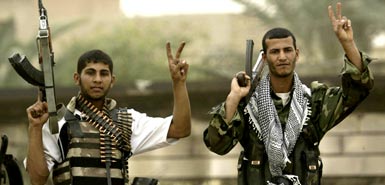Iraq Struggles To Stem Iranian Incursion
London Times – Iraq Struggles To Stem New Incursion [$]
TO DRIVE to the Iranian border from the Iraqi city of Basra is to cross one of the most bitterly fought-over patches of territory in the world. Rotting tanks and tangles of barbed wire mark the sites of the fiercest battles of the eight-year Iran-Iraq war. Now, 16 years later, the area is once again the site of intrigue and tension. Smugglers and illegal immigrants play a cat-and-mouse game with guards. Unknown gunmen fire shots across the border at night and there are rumours of infiltration by terrorists and spies. The ancient rivalry between the Arabs of lowland Mesopotamia and the Persians of Iran is alive again and this time the Persians are gaining the upper hand.
Stuck somewhere in the middle are the protectors and custodians of this sensitive area, the 8,000-strong British Forces of the Multi-National Division South-East. In a murky incident last month, eight British Marines were seized while navigating the river border with Iran.
The suspicion among many in Iraq is that these seemingly insignificant skirmishes are the opening moves in a long-term strategy by Tehran to create an Iranian sphere of influence in southern Iraq. “That’s what the average Basran fears,†says Colonel David Cullen, commanding officer of the Royal Horse Artillery, which is training the Iraqi police and border guards. “They fear it more than anything else.â€
Controlling this border has always been an impossible task, and for several months after the coalition invasion effective policing ceased altogether. This year, the Royal Horse Artillery began training and equipping the Iraqi Border Police. Eventually, they will number 5,000, but at present they are at less than half strength. Between the official crossings and a string of fortress-like border posts, there is virtually no monitoring. Iranian pilgrims cross to visit the great Shia shrines at Najaf and Karbala. Lorries bring fruit, electrical goods and construction materials. By dodging the guards, smugglers can avoid the 5 per cent import tax, and bring in guns and drugs. At the Shalamcheh crossing, east of Basra, a small unit of British soldiers leaves the job of processing border traffic to a group of demoralised Iraqi guards. There is not a single computer, and few of the incoming Iranians have passports — they are allowed in with easily forged documents issued by travel agents. “We don’t even have the minimum of equipment,†says Abdullah Jabar. “Our patrol has just two Kalashnikovs between us, with five bullets in each. A few days ago, we were called out to arrest smugglers, but they could have killed us, so we just left them to do what they wanted. There is bribery here too. Our work is chaotic, but the Iranians, they are very well organised.â€
But who are these Iranians, and what are they organising for? Of the 1,400 occupants of Basra’s jail, only 36 are Iranian, most of them smugglers. But a string of more sinister incidents along the border suggests that political agendas are being pursued, as well as the quick profits to be made from heroin and marijuana. The most spectacular was the seizing of the eight British Marines, whose boats and weapons are still in Iranian hands. Two weeks ago Iraq announced that two Iranians had been arrested in Baghdad while attempting to set off a car bomb. And at least twice this month machineguns have been fired at night from the Iranian side of the border towards Iraqi workers prospecting for oil on their own side. “It could be tribes scrapping over oil, it could be the Iranian border police,†says Colonel Cullen. “We really don’t know.â€
Matters are complicated by the existence of dozens of Iraqi Shia political parties, with varying degrees of loyalty to Iran. Some, like the Supreme Council of the Islamic Revolution in Iraq and the Badr Brigade, were supported by Iran during the years of Saddam Hussein. The question is whether they will identify themselves as Shias first, united with their Iranian Shia brethren across the border, or as Iraqis, threatened by Iranian encroachment. The final answer, in this ambiguous part of the world, may not come for years. “Iranians have a long-term strategy,†says a senior Arab official. “They see the belt of Iran-Iraq-Syria-Lebanon developing. We think five years ahead, they think fifty years ahead.
Something that bears watching, to be sure.





